短文改错四大错误类型总结
短文改错四大错误类型总结

短文改错四大错误类型总结老师叮咛:李辉老师说,英语学习的陷阱之一,就是 “ 多做题 ”。
很多人一想到学英语就想到 “ 多做题 ”,但是做了很久都没提分,原因何在?事实上,每道题目都背后都有其 “ 方法 ” 和 “ 考点 ” 。
下面的短文改错常见错误考点类型 “ 很重要 ”!经过了全网首席高考英语名师李辉老师团队高度认真地整理 校对,无错、可信!可供全国各省高中生打印、学习、背诵!一、动词① 时态错误(过去时 / 现在时)eg:1. Some people even had to wait outside.解析: had 改为 have 。
2. I think I would be happy there .解析: think 改为 thought 。
② 语态错误(主动 / 被动)注意:先翻译句子,后观察该词在句中是主动 / 被动。
eg: Every day he makes sure that fresh vegetables or high quality oil are using for cooking.每天,他都要确保新鲜蔬菜或高质量的油用于烹饪。
解析: using → used ,根据句意此处表示被动含义, be used for“ 被用来去做 ” 。
③ 主谓不一致( 1 ) 前文所提的主语与后文所述的谓语不一致eg:1.The teacher were angry because we had the same answers in the tests.解析: were → was , The teacher 是单数形式,谓语动词用单数形式。
2.The rest of the trees was cut down.解析: was → were , rest 指的是可数名词的复数形式,谓语动词用复数形式。
( 2 ) 集体名词,谓语动词用复数。
如: people, cattle, group, family, government, team, police 等。
高考短文改错常见错误解析与纠正策略

高考短文改错常见错误解析与纠正策略高考短文改错是高考英语试卷中的重要题型之一,考查学生对语法、拼写、词汇等方面的掌握情况。
然而,很多学生在做这类题目时常常出现一些常见错误。
本文将针对高考短文改错中的常见错误进行解析,并提出纠正策略,帮助学生们更好地应对这一题型。
首先,让我们来看一下高考短文改错中常见的错误类型。
1.词汇错误:学生们常常会将一个单词的原形或正确变形写成另一个单词,或者将一个单词的拼写错误,从而导致语句的意思发生变化。
例如,将“important”写成“importent”、将“happiness”写成“happyness”等。
2.语法错误:学生们在使用时态、语态、主谓一致等方面容易出现错误。
例如,将“have”写成“had”、将“is”写成“am”等。
3.冠词错误:学生们在使用不定冠词、定冠词时容易出现错误。
例如,将“a book”写成“an book”、将“the cat”写成“a cat”等。
4.标点错误:学生们在使用标点符号时常常会出现错误,如缺少标点、标点符号使用错误等。
例如,将“Hello I'm Tom”写成“Hello, I'm Tom.”、在句子中间使用句号等。
针对这些常见的错误,我们可以采取以下纠正策略。
1.词汇错误:学生们可以通过加强词汇的记忆和复习来避免这类错误。
同时,可以充分利用词典和语料库等工具,来检查自己写出的词语是否拼写正确。
2.语法错误:学生们可以通过加强语法知识的学习和理解来纠正这类错误。
特别是需要注意时态、语态、主谓一致等语法知识点的正确运用。
此外,多阅读英语文章和写作练习也能帮助学生们提高语法水平。
3.冠词错误:学生们可以通过阅读和积累大量的英语文章来提高冠词的正确使用。
另外,可以通过模仿和仿写来训练自己对冠词的掌握。
4.标点错误:学生们可以通过多读英语文章和练习来提高标点符号的正确使用。
此外,也可以请教老师或同学来帮助自己检查标点使用的准确性。
中考语文短文改错题解题中的常见错误类型与修改技巧
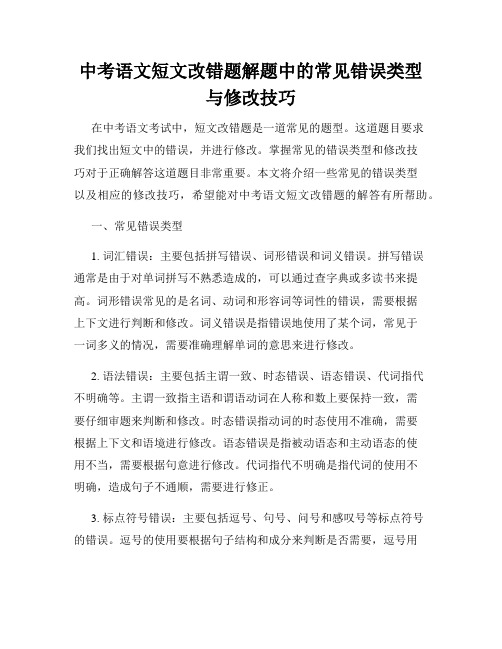
中考语文短文改错题解题中的常见错误类型与修改技巧在中考语文考试中,短文改错题是一道常见的题型。
这道题目要求我们找出短文中的错误,并进行修改。
掌握常见的错误类型和修改技巧对于正确解答这道题目非常重要。
本文将介绍一些常见的错误类型以及相应的修改技巧,希望能对中考语文短文改错题的解答有所帮助。
一、常见错误类型1. 词汇错误:主要包括拼写错误、词形错误和词义错误。
拼写错误通常是由于对单词拼写不熟悉造成的,可以通过查字典或多读书来提高。
词形错误常见的是名词、动词和形容词等词性的错误,需要根据上下文进行判断和修改。
词义错误是指错误地使用了某个词,常见于一词多义的情况,需要准确理解单词的意思来进行修改。
2. 语法错误:主要包括主谓一致、时态错误、语态错误、代词指代不明确等。
主谓一致指主语和谓语动词在人称和数上要保持一致,需要仔细审题来判断和修改。
时态错误指动词的时态使用不准确,需要根据上下文和语境进行修改。
语态错误是指被动语态和主动语态的使用不当,需要根据句意进行修改。
代词指代不明确是指代词的使用不明确,造成句子不通顺,需要进行修正。
3. 标点符号错误:主要包括逗号、句号、问号和感叹号等标点符号的错误。
逗号的使用要根据句子结构和成分来判断是否需要,逗号用错会影响句子的意思。
句号、问号和感叹号则需要根据句意来判断是否需要使用,并且要注意标点符号的位置。
4. 连词错误:主要包括并列连词和从属连词的错误。
并列连词主要有"和"、"或"、"但"等,需要根据句意和语境来选用正确的连词。
从属连词主要有"如果"、"因为"、"尽管"等,需要根据句子逻辑关系来判断使用的从属连词是否正确。
二、修改技巧1. 仔细审题:短文改错题通常附有一段短文,并要求在文中标出错误并进行修改。
要仔细审题,了解修改的规则和要求,例如要求修改的错误数量或所需修改的错误类型。
高中英语知识点归纳短文改错的常见错误类型

高中英语知识点归纳短文改错的常见错误类型在高中英语学习中,学生需要不断地进行短文改错练习,以提升自己的语法和语句表达能力。
但是,在进行短文改错题目时,学生常常会犯一些常见的错误。
本文将对高中英语知识点归纳短文改错的常见错误类型进行探讨和总结。
一、冠词错误在短文改错中,学生常常会出现冠词错误的情况。
其中,最常见的是使用了错误的冠词,例如使用"a"而不是"an",或者使用"the"而不是不定冠词"a/an"。
另外,学生也容易忽略在需要使用冠词的地方。
例如:原文:I want an apple, so I went to supermarket.修改后:I wanted an apple, so I went to the supermarket.二、动词时态错误动词时态错误也是学生在短文改错中常见的问题之一。
学生常常会在动词时态上犯错误,包括使用了错误的时态,例如将过去时用于现在情况下,或者将现在时用于过去情况下。
例如:原文:Yesterday, I go to the park and meet my friends.修改后:Yesterday, I went to the park and met my friends.三、主谓一致错误在短文改错中,主谓一致错误也是常见的错误类型。
学生容易忽略主语与谓语动词的一致性,特别是在句子较长或主语与谓语之间有其他修饰成分的情况下。
例如:原文:The dog that belong to my neighbor often bark at night.修改后:The dog that belongs to my neighbor often barks at night.四、代词错误代词错误也是学生在短文改错中常犯的错误类型之一。
学生容易混淆人称代词和指示代词的用法,或者使用错误的格形式。
中考语文短文改错题解题中的常见错误原因与修改建议
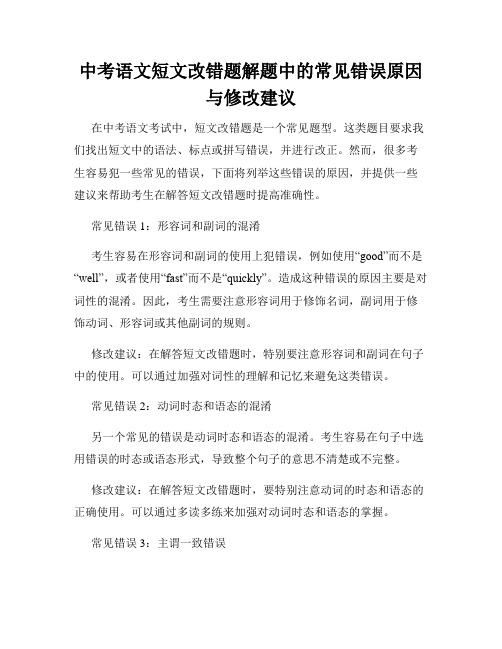
中考语文短文改错题解题中的常见错误原因与修改建议在中考语文考试中,短文改错题是一个常见题型。
这类题目要求我们找出短文中的语法、标点或拼写错误,并进行改正。
然而,很多考生容易犯一些常见的错误,下面将列举这些错误的原因,并提供一些建议来帮助考生在解答短文改错题时提高准确性。
常见错误1:形容词和副词的混淆考生容易在形容词和副词的使用上犯错误,例如使用“good”而不是“well”,或者使用“fast”而不是“quickly”。
造成这种错误的原因主要是对词性的混淆。
因此,考生需要注意形容词用于修饰名词,副词用于修饰动词、形容词或其他副词的规则。
修改建议:在解答短文改错题时,特别要注意形容词和副词在句子中的使用。
可以通过加强对词性的理解和记忆来避免这类错误。
常见错误2:动词时态和语态的混淆另一个常见的错误是动词时态和语态的混淆。
考生容易在句子中选用错误的时态或语态形式,导致整个句子的意思不清楚或不完整。
修改建议:在解答短文改错题时,要特别注意动词的时态和语态的正确使用。
可以通过多读多练来加强对动词时态和语态的掌握。
常见错误3:主谓一致错误主谓一致错误也是短文改错题中常见的错误之一。
考生容易因为主谓在数量上不一致而犯错,例如单数主语配以复数谓语,或者复数主语配以单数谓语。
修改建议:在解答短文改错题时,要仔细检查主语和谓语之间的一致性。
可以通过意识训练和相应练习来提高对主谓一致错误的敏感度。
常见错误4:标点符号的错误使用标点符号的错误使用也是常见的错误之一。
考生容易在句子中使用错误的标点符号,如使用逗号而不是句号或分号,或者使用破折号而不是引号。
修改建议:在解答短文改错题时,要注意标点符号的正确使用。
可以通过多读多练来提高对标点符号的运用能力。
总结与展望:短文改错题在中考语文考试中是一个重要的题型。
为了提高解答的准确性,我们需要注意常见错误的原因,并按照相应的修改建议来加以改正。
只有通过不断的练习和积累,我们才能在这一题型上取得更好的成绩。
短文改错归纳总结2

短文改错归纳总结一、错误类型多词:冠词、介词、动词不定式符号to等。
漏词:冠词、介词、动词不定式符号to、系动词、物主代词等。
错词:(一)语法错误1.主谓不一致;2.时态不一致;3.指代不一致;4.平行不一致;5.名词的单复数;6.词的固定搭配和惯用法(如:get used to doing sth.)7.词性的误用(形/副);8.冠词的误用;9.语态、非谓语动词;10.形容词、副词的比较级和最高级混用。
(二)逻辑错误1.上下行文逻辑错误(and/but/or/so);2.主从复合句中连词或引导词的误用;3.句意混乱(up/down ;here/there)。
二、常见错误设置模式1.①在so…that…结构中,so 和that不同行,把that放在下一行,so 的位置上写成了very;②too…to…结构中, too写成了very;③There is no need to do sth.中There 用成了It;④It is/has been…years since…中since用成了when;⑤was/were doing…when…结构中,when用成了while。
2. the same…中the 用成了a或漏掉定冠词the(same永远和the 在一起.如the same as与…一样/相同; all the same仍然,还是; the same to you);for a long time(长时间)漏掉a;most of the…漏掉the;for the first time(第一次)漏掉the;make progress中间加了a。
3. repeat之后加了again;return之后加了back;enter之后加了into/to。
4. because/ since和so连用;although /though和but连用;reason和because连用(T he reason why…is that…;Another reason is that…)。
高中解析短文改错题常见错误类型
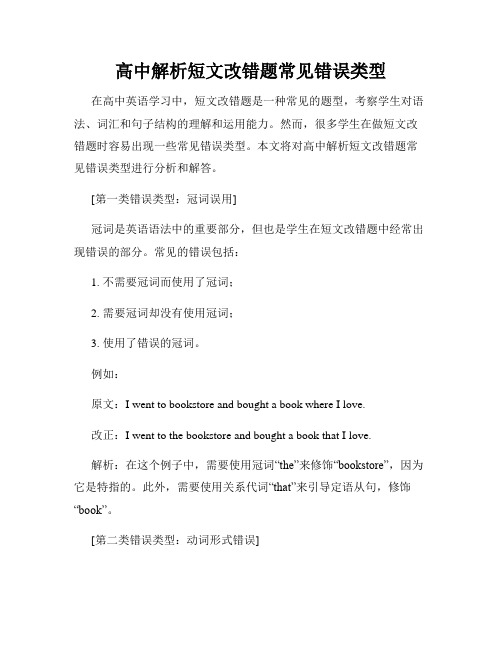
高中解析短文改错题常见错误类型在高中英语学习中,短文改错题是一种常见的题型,考察学生对语法、词汇和句子结构的理解和运用能力。
然而,很多学生在做短文改错题时容易出现一些常见错误类型。
本文将对高中解析短文改错题常见错误类型进行分析和解答。
[第一类错误类型:冠词误用]冠词是英语语法中的重要部分,但也是学生在短文改错题中经常出现错误的部分。
常见的错误包括:1. 不需要冠词而使用了冠词;2. 需要冠词却没有使用冠词;3. 使用了错误的冠词。
例如:原文:I went to bookstore and bought a book where I love.改正:I went to the bookstore and bought a book that I love.解析:在这个例子中,需要使用冠词“the”来修饰“bookstore”,因为它是特指的。
此外,需要使用关系代词“that”来引导定语从句,修饰“book”。
[第二类错误类型:动词形式错误]动词形式错误也是高中短文改错题中的常见错误类型之一。
常见的错误包括:1. 动词时态错误;2. 动词主谓不一致;3. 动词形式错误(过去分词形式、现在分词形式等)。
例如:原文:Yesterday, Mary go to the supermarket and buy some vegetables.改正:Yesterday, Mary went to the supermarket and bought some vegetables.解析:在这个例子中,需要使用一般过去时态的动词形式“went”,因为动作发生在过去。
此外,需要使用过去式“bought”来描述过去发生的购买行为。
[第三类错误类型:词性误用]词性误用也是一个常见的错误类型。
学生容易将名词误用为动词、形容词误用为副词等。
常见的错误包括:1. 名词误用为动词;2. 形容词误用为副词;3. 名词误用为形容词。
小学六年级知识总结短文改错常见错误类型分析
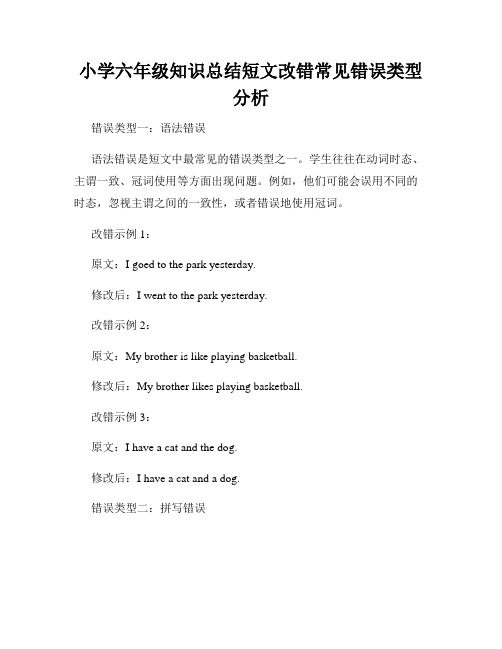
小学六年级知识总结短文改错常见错误类型分析错误类型一:语法错误语法错误是短文中最常见的错误类型之一。
学生往往在动词时态、主谓一致、冠词使用等方面出现问题。
例如,他们可能会误用不同的时态,忽视主谓之间的一致性,或者错误地使用冠词。
改错示例1:原文:I goed to the park yesterday.修改后:I went to the park yesterday.改错示例2:原文:My brother is like playing basketball.修改后:My brother likes playing basketball.改错示例3:原文:I have a cat and the dog.修改后:I have a cat and a dog.错误类型二:拼写错误拼写错误是另一类常见的错误类型。
学生可能会在单词拼写上犯错,导致整篇短文的准确性受到影响。
这些错误可能涉及到音标、单词结构等方面。
改错示例1:原文:My freinds and I went to the zoo.修改后:My friends and I went to the zoo.改错示例2:原文:I hav a pet catt.修改后:I have a pet cat.改错示例3:原文:I like playind soccer.修改后:I like playing soccer.错误类型三:标点符号错误标点符号错误会影响到句子的流畅性与语义表达的准确性。
学生常常会在标点符号的使用上犯迷糊,加入错误的标点或者忽视正确使用标点。
改错示例1:原文:My favorite activities are swimming basketball and playing chess.修改后:My favorite activities are swimming, basketball and playing chess.改错示例2:原文:Yesterday I went to the park but there was no one there.修改后:Yesterday, I went to the park but there was no one there.改错示例3:原文:I am happy because I got a new bike.修改后:I am happy because I got a new bike!错误类型四:选词错误选词错误是指学生在选择合适的单词或者词组时出现错误。
中考语文短文改错常见错误

中考语文短文改错常见错误中考时,语文短文改错是一个常见的题型,要求学生根据给出的短文,在文章中找出错误并加以改正。
这是一项考察学生语文水平和对语法、用词等方面的掌握程度的重要任务。
下面,我们将介绍一些考生在这一题型中常见的错误,并提供相应的改正建议。
1. 词语搭配错误【例句】原文:她马上就到达车站,拿出车票。
改正:她马上就到达车站,取出车票。
解析:在这个例句中,用词搭配错误。
"拿出"这个词与"车票"不搭配,应改为"取出"。
2. 语法错误【例句】原文:我们在这个周末去了动物园,吃了很多好吃的食物。
改正:我们在这个周末去了动物园,品尝了很多美味的食物。
解析:这个例句中的"吃了很多好吃的食物"存在语法错误。
可以使用"品尝了很多美味的食物"来改正,语法更准确。
3. 标点符号错误【例句】原文:我喜欢看书可是我没有太多时间。
改正:我喜欢看书,可是我没有太多时间。
解析:这个例句中的"我喜欢看书可是我没有太多时间"缺少逗号。
加上逗号可以使句子结构更清晰。
4. 冠词用词错误【例句】原文:我在买了一个新的手机。
改正:我在买一个新的手机。
解析:这个例句中的"我在买了一个新的手机"多余了一个冠词"了"。
去除"了"后句子更通顺。
5. 时态错误【例句】原文:我刚才跑去告诉他这个好消息。
改正:我刚才跑去告诉他那个好消息。
解析:这个例句中的"这个好消息"使用了错误的时态。
根据上下文,应该改为"那个好消息"。
通过对常见错误的分析和改正,我们可以了解到在中考语文短文改错中需要注意的要点。
在实际解题中,我们还需要结合上下文,准确把握改错的关键点。
只有掌握了常见的错误类型并通过练习来提高自己的改错能力,才能在考试中取得好的成绩。
短文改错常见错误原因分析
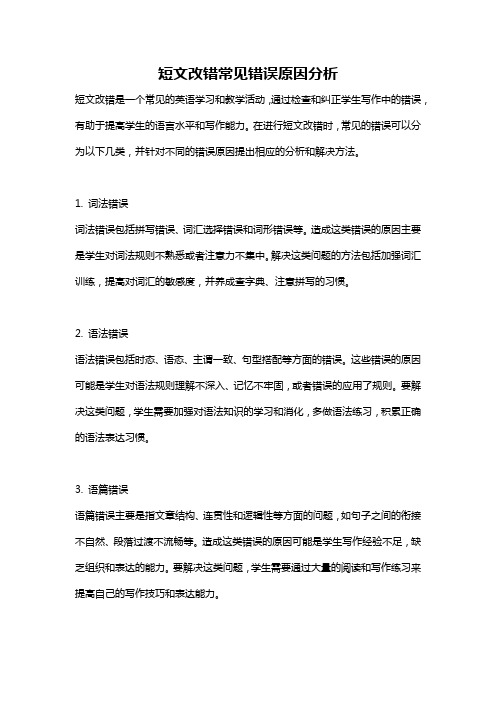
短文改错常见错误原因分析短文改错是一个常见的英语学习和教学活动,通过检查和纠正学生写作中的错误,有助于提高学生的语言水平和写作能力。
在进行短文改错时,常见的错误可以分为以下几类,并针对不同的错误原因提出相应的分析和解决方法。
1. 词法错误词法错误包括拼写错误、词汇选择错误和词形错误等。
造成这类错误的原因主要是学生对词法规则不熟悉或者注意力不集中。
解决这类问题的方法包括加强词汇训练,提高对词汇的敏感度,并养成查字典、注意拼写的习惯。
2. 语法错误语法错误包括时态、语态、主谓一致、句型搭配等方面的错误。
这些错误的原因可能是学生对语法规则理解不深入、记忆不牢固,或者错误的应用了规则。
要解决这类问题,学生需要加强对语法知识的学习和消化,多做语法练习,积累正确的语法表达习惯。
3. 语篇错误语篇错误主要是指文章结构、连贯性和逻辑性等方面的问题,如句子之间的衔接不自然、段落过渡不流畅等。
造成这类错误的原因可能是学生写作经验不足,缺乏组织和表达的能力。
要解决这类问题,学生需要通过大量的阅读和写作练习来提高自己的写作技巧和表达能力。
4. 意思不明确或模糊这类错误包括表达不清楚、意思不明确等问题。
原因可能是学生思维不清晰、表达能力有限。
解决这类问题的方法是培养学生的逻辑思维和表达能力,鼓励学生多思考并结构化地表达自己的观点。
5. 文化差异引起的错误这类错误通常是由于学生对英语的文化背景不了解或者对中文思维习惯的影响。
解决这类问题的方法是帮助学生了解英语和中文的语言和文化差异,培养跨文化交际的能力。
总的来说,短文改错常见错误的原因主要包括词法不熟练、语法理解不深入、写作经验不足、思维不清晰等。
解决这些问题的关键在于加强相关知识的学习和掌握,多做练习和积累经验,并注重发展学生的逻辑思维和表达能力。
通过不断的训练和实践,学生可以逐渐提高自己的写作水平,减少犯错的机会。
短文改错常见的错误及对策.ppt

(四)冠词方面的错误。主要指a(n)与the的混用, a 与an的误用,尤其要看可数单数名词前是否缺冠 词或不需用冠词时用了冠词。
1.An American and a Frenchman decided to cross the sea between France and England in the balloon in 1784.
5.We hung a sign on the front door that was read:"we’ r having dinner…
6.I hoped that you think about my request and visit us a soon…
7.…even when I went to her with all my little boy problems and shout at her.
一、 常见的错误:
(一)时态、语态方面的错误。主要是现在时态 与过去时态,主动语态与被动语态之间的误用, 做题时要把握全文时态基调,注意平行结构与动 词之last night who have not stayed in B﹠B hotel before.
3. I became very active but made new friends. 4. My hometown is a pretty city, so people there are kind
and polite. 5. While they find fish coming to the surface, the fly down
8. He and she should make the class very active by joking with the students.
中考语文短文改错常见错误分析
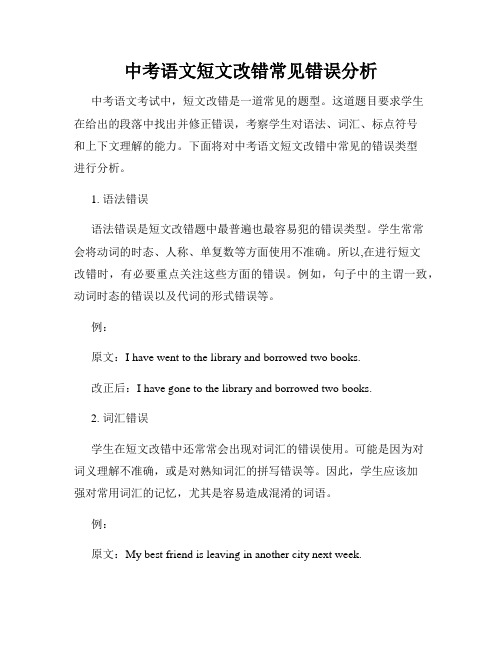
中考语文短文改错常见错误分析中考语文考试中,短文改错是一道常见的题型。
这道题目要求学生在给出的段落中找出并修正错误,考察学生对语法、词汇、标点符号和上下文理解的能力。
下面将对中考语文短文改错中常见的错误类型进行分析。
1. 语法错误语法错误是短文改错题中最普遍也最容易犯的错误类型。
学生常常会将动词的时态、人称、单复数等方面使用不准确。
所以,在进行短文改错时,有必要重点关注这些方面的错误。
例如,句子中的主谓一致,动词时态的错误以及代词的形式错误等。
例:原文:I have went to the library and borrowed two books.改正后:I have gone to the library and borrowed two books.2. 词汇错误学生在短文改错中还常常会出现对词汇的错误使用。
可能是因为对词义理解不准确,或是对熟知词汇的拼写错误等。
因此,学生应该加强对常用词汇的记忆,尤其是容易造成混淆的词语。
例:原文:My best friend is leaving in another city next week.改正后:My best friend is moving to another city next week.3. 标点符号错误标点符号在语文写作中起到重要的分隔和修辞作用。
在短文改错中,学生经常会将标点符号使用错误,如缺少逗号、误用句号等。
因此,学生在改错时应注意标点符号的正确使用,确保句子结构和意思的准确表达。
例:原文:Yesterday, I went shopping I bought new clothes, shoes and bags.改正后:Yesterday, I went shopping. I bought new clothes, shoes, and bags.4. 上下文理解错误短文改错题目通常会给出一段完整的上下文,学生需要根据上下文的提示来找出并修正错误。
高考英语冲刺短文改错的常见错误与避免方法

高考英语冲刺短文改错的常见错误与避免方法在高考英语中,短文改错是一项考查学生综合语言运用能力的题型。
对于许多同学来说,这部分题目具有一定的挑战性,但只要我们了解常见的错误类型,并掌握相应的避免方法,就能够在考试中提高得分率。
接下来,让我们一起深入探讨一下短文改错的常见错误以及有效的避免策略。
一、动词错误1、时态错误时态是短文改错中常见的考点之一。
同学们需要根据上下文的语境,判断句子所使用的时态是否正确。
例如,文章描述的是过去的事情,却使用了现在时态的动词。
避免这种错误的方法是仔细阅读上下文,确定事件发生的时间,并选择与之对应的正确时态。
2、主谓不一致主谓不一致的错误也较为常见。
当主语是复数,而谓语动词却用了第三人称单数形式,或者反之。
为了避免这类错误,我们要明确主语的单复数形式,尤其要注意一些集合名词,如 family、class 等,它们在不同语境中可能表示单数或复数。
3、非谓语动词使用错误非谓语动词包括动词不定式、动名词和分词。
常见的错误如 forgetto do 和 forget doing 的混淆,或者现在分词和过去分词的误用。
要解决这个问题,需要牢记非谓语动词的各种形式及其用法,并结合句子的逻辑和语境进行判断。
二、名词错误1、单复数错误名词的单复数形式使用不当是常见的错误类型。
有时是因为忽略了名词前的修饰词或句子的整体意思,导致应该用复数的名词用了单数,或者反之。
在复习时,要特别注意一些常见的单复数变化规则,以及不规则名词的复数形式。
2、名词所有格错误名词所有格的错误包括遗漏撇号或使用不当。
例如,“Tom book”应该是“Tom's book”。
我们需要明确表示所属关系时名词所有格的正确用法。
三、形容词和副词错误1、形容词和副词的混淆有些同学容易把形容词和副词用错,比如修饰动词应该用副词,却用了形容词。
要避免这种错误,就要清楚形容词和副词的功能和用法,形容词通常用来修饰名词,副词通常用来修饰动词、形容词或其他副词。
高中英语短文改错常见改错类型总结

高中英语短文改错常见改错类型总结
在高中英语的研究中,短文改错是一种常见的题型。
下面总结
了一些常见的改错类型,供同学们参考。
1. 单词拼写错误
在短文中经常会出现单词拼写错误的情况。
同学们应该注意拼
写并使用拼写检查工具来避免错误。
2. 词性使用错误
有时候同学们会错误地使用词性,比如将形容词误用为副词等。
在改错时,需要对照语法规则来判断词性的正确使用。
3. 主谓一致错误
主谓一致是英语语法中一个重要的概念,同学们在改错时应该
特别注意主谓一致关系,确保句子结构正确。
4. 冠词使用错误
冠词的使用对于句子的意义和语法非常重要。
同学们在改错时,要仔细判断冠词的正确使用,避免错误的出现。
5. 时态错误
时态的使用是英语语法中的重点之一。
同学们在改错时应该特别注意时态的一致性和正确使用。
6. 句子结构错误
有时同学们会忽略句子结构的正确性,导致句子的表达不清晰或错误。
在改错时,要对照语法规则来判断句子结构的正确性。
这些是高中英语短文改错中常见的错误类型,同学们在备考和写作时要多加注意。
通过练习和积累,同学们的改错能力会不断提升。
高中短文改错常见错误解析与排查

高中短文改错常见错误解析与排查在高中阶段,学生们需要经常写作文,而写作中的错误是难以避免的。
为了帮助同学们提高写作水平,我们需要了解一些常见的错误,并能够及时发现和纠正这些错误。
本文将就高中短文改错过程中常见的错误进行解析与排查。
一、拼写错误拼写是写作中最容易出现错误的方面之一。
拼写错误可能导致读者对文章的理解产生误导,因此在写作过程中,务必要注意拼写的准确性。
下面是一些常见的拼写错误例子及解析:1. 写错单词例如:She is a very responsibly person. (responsibly → responsible)解析:正确的单词应为"responsible",表示负责任的。
2. 重复或遗漏字母例如:He is a exellent student. (exellent → excellent)解析:正确的单词应为"excellent",表示优秀的。
二、用词错误在写作中,选择合适的词汇是至关重要的。
错误的用词可能使文章表达不准确,给读者造成误解。
以下是一些常见的用词错误例子及解析:1. 误用同义词例如:He is a very happy pers on. (happy → glad)解析:应该使用"glad"来表达非常高兴的意思。
2. 误用形容词与副词例如:He speaks English good. (good → well)解析:应使用"well"来修饰动词。
三、语法错误语法错误是写作中最常见的错误之一。
错误的语法使用会导致句子结构混乱,使读者难以理解。
以下是一些常见的语法错误例子及解析:1. 主谓不一致例如:One of my favorite hobbies are photography. (are → is)解析:应该使用"one"作为单数主语,所以谓语动词要用"is"。
高考短文改错错点分类归纳课件

详细描述
虚拟语气错误通常是由于混淆了虚拟语气和真实条件句所导致的。例如,“If I were you, I would do it”应该改为“If I was you, I would do it”。
非谓语动词错误
总结词
非谓语动词错误是指句子中的非谓语 动词(如不定式、动名词等)使用不 当。
详细描述
介词错误
01
介词搭配不当
02
介词遗漏或多余
03
介词搭配不当,如介词与动词、形容词等 搭配不正确。
04
介词遗漏或多余,如句子中缺少必要的介 词或多余的介词出现。
02
语法错误
主谓不一致
总结词
主谓不一致是指在句子中主语和谓语动词的数不一致的情况 。
详细描述
主谓不一致是常见的语法错误之一,通常是由于主语和谓语 动词的数不一致所导致的。例如,“The students are reading books”应该改为“The students are reading books”。
详细描述
段落间逻辑关系错误通常表现为段落顺序混乱、段落内容重复或段落间缺乏过渡等。这 些错误会影响文章的整体连贯性和可读性。
全文逻辑结构混乱
要点一
总结词
全文逻辑结构混乱是指文章整体结构不清晰,段落和句子 之间的逻辑关系混乱,导致读者无法理解文章的中心思想 。
要点二
详细描述
全文逻辑结构混乱可能表现为文章开头没有明确主题、结 尾没有总结或文章结构跳跃等。这种错误会导致读者对文 章的整体思路和中心思想产生困惑,影响理解和评价。
高考短文改错错点分 类归纳课件
目录
CONTENTS
• 词汇错误 • 语法错误 • 语义错误 • 行文逻辑错误 • 特殊改错点
高考短文改错错误类型整理
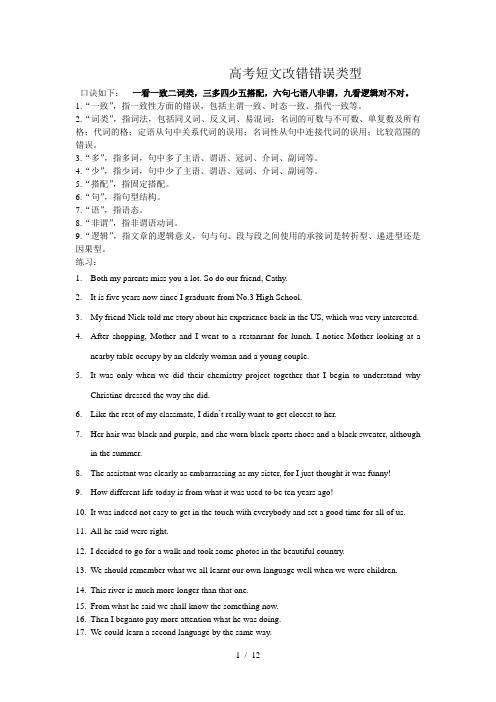
高考短文改错错误类型口诀如下:一看一致二词类,三多四少五搭配,六句七语八非谓,九看逻辑对不对。
1.“一致”,指一致性方面的错误,包括主谓一致、时态一致、指代一致等。
2.“词类”,指词法,包括同义词、反义词、易混词;名词的可数与不可数、单复数及所有格;代词的格;定语从句中关系代词的误用;名词性从句中连接代词的误用;比较范围的错误。
3.“多”,指多词,句中多了主语、谓语、冠词、介词、副词等。
4.“少”,指少词,句中少了主语、谓语、冠词、介词、副词等。
5.“搭配”,指固定搭配。
6.“句”,指句型结构。
7.“语”,指语态。
8.“非谓”,指非谓语动词。
9.“逻辑”,指文章的逻辑意义,句与句、段与段之间使用的承接词是转折型、递进型还是因果型。
练习:1.Both my parents miss you a lot. So do our friend, Cathy.2.It is five years now since I graduate from No.3 High School.3.My friend Nick told me story about his experience back in the US, which was very interested.4.After shopping, Mother and I went to a restanrant for lunch. I notice Mother looking at anearby table occupy by an elderly woman and a young couple.5.It was only when we did their chemistry project together that I begin to understand whyChristine dressed the way she did.6.Like the rest of my classmate, I didn’t really want to get closest to her.7.Her hair was black and purple, and she worn black sports shoes and a black sweater, althoughin the summer.8.The assistant was clearly as embarrassing as my sister, for I just thought it was funny!9.How different life today is from what it was used to be ten years ago!10.It was indeed not easy to get in the touch with everybody and set a good time for all of us.11.All he said were right.12.I decided to go for a walk and took some photos in the beautiful country.13.We should remember what we all learnt our own language well when we were children.14.This river is much more longer than that one.15.From what he said we shall know the something now.16.Then I beganto pay more attention what he was doing.17.We could learn a second language by the same way.18.Long ago there had a war between the two countries.19.He broke the law and punished.20.I tried to tell him about it, but he just wasn”t interesting at all.21.I began to run and it was too late.专题一名词与冠词重点1 句中名词的单复数形式是否符合句意1.When he told us the news, we were all in high spirit.2.Two Englishmen and Germen attended the meeting.3.They went to the nearest restaurants and sat at the table near the window.重点2 可数名词和不可数名词之间的误用4.You can find all kinds of informations in just a few minutes on the Internet.5.----What can I do for you?----Two tea, please.6.Nowadays visitors no longer threw waste papers or plastic bags everywhere and it lookedcleaner and more beautiful.7.Physics are taught by Mr. Wang in our school this semester.8.It is great pleasure to talk with you at such an occasion.重点3 句中名词所有格的误用9.He sent his daughter to a girl’s high school.重点4 两个不定冠词之间的误用10.Don’t lose such an unique opportunity now that there is little time.11.Our team got first in the relay race.12.He failed the exam in a consequence of teaching.重点5 定冠词和不定冠词之间的误用13.He went to his room and pulled down blinds.14.We rent the house by month when we worked at that factory.15.I prefer living in country to being in the town.16.We are one family and live under same roof, but we do not seem to get much time to talktogether.17.At last we came to a small town. The houses were new, and streets were wide.18.The next day, after we’d had good breakfast, we were ready for another view of the GreatWall.19.He was elected the monitor of our class.20.The driver was at a loss when the word came that he was forbidden to drive for speeding.21.Then when we went away, we took each other’s notebook by the mistake.重点6 冠词的漏用22.As we all left home at early age, we met lots of problems in our daily life.重点7 冠词在固定结构中的误用23.He was born in a small village by sea.专题二代词重点1 人称代词1.It is also natural that parents want to protect and guide his children.2.There are forty students in our class, and thirty of them are boys.3.Learning as many English words as possible by heart is indeed necessary for we all to learnEnglish.重点2 物主代词4.In England we have been leaning about it’s rich culture and long history.5.That village appears similar to me, but I am not familiar with it at all.6.The day before the speech contest English teacher talked to me.重点3 反身代词7.When you come, you can stay with ourselves.8.And we can also know the society by serving it yourself.9.We enjoyed us very much last night.10.The mother hopes that the children will behave by themselves.11.They had a heated debate in themselves重点4 不定代词12.This book is a good seller, so you can buy one at either shop in Beijing.13.Some people would rather ride bicycles as bicycle riding has neither of the trouble of takingbuses.14.As for renting houses to live alone, it’s better for study as you can feel free in your own roomwithont being interrupted by the others.15.My fellow classmates, I will have anything about my future.16.Understanding the cultural habits of another nation, especially that containing as manydifferent cultures as the United States is a difficult thing.17.I love reading poems by Emerson better than that by Whitman.18.The year of 2010 is a happy year, that has brought us Chinese so much joy and pleasure.19.This is tha first composition which he has written in English.20.Let children read such books which will make them wiser.专题三介词重点1 具体语境中的介词用法辨析1.She usually stays at home in Sunday morning.2.She has been ill from last Monday.3.She will come back after a day or two.4.After that they built a bridge through the river.5.I saw an ad on the newspaper this morning.6.The professor will make the report about the situation in the Middle East on Saturday.7.Most of the large cities in the world have grown without plans, between which London is asuch one.8.I know nothing about him except the fact that he lives next door.9.The little old man in thick glasses is my first chemistry teacher.10.Water can be turned in ice if it is made cold enough.11.In the end of the day the new manager is no better than the previous one.12.On the corner of the room stood a big old chair.13.I imagine you ’ll be at vacation yourself at that time.重点2 介词的遗漏或冗余14.The book is considered to be great value to you in your studies.15.Because of air pollution being greatly reduced, this city is still a good one to live.重点3 介词与动词的搭配16.Then my mind becomes clear and I concentrate the way my body moves in the air.17.They didn’t seem to have much time to talk about toghether.18.If you fail the exam you will only have yourself to blame for.19.He had worked hard and was looking forward for his retirement..20.Several of the members have come up suggestions of their own,.21.We must pay attention to listen to the teacher in the classroom.22.He took advantage over my generosity and borrowed much money from me.重点4 形容词与介词的搭配23.She was particular to what she wore when she was still a little child.24.He was eager with work, for he could not imagine life without it.重点5 介词与名词的搭配25.She broke their vase by chance, while they destroyed hers by purpose.26.The accident was my fault, so I had to pay for the damage on the other car.重点6 连词与介词的搭配27.August is the best time of the year to visit Beijing, because of there is only a little rain and theweather is neither too hot nor too cold.28.Take your skates in case of you decide to go skating.专题四连词重点1 过渡词1.Students who work part-time earn extra money; however, they earn a lot about the societythey live in.2.Beside, we have to consider their health condition.3.It’s hard work.. I enjoy it, but..重点2 并列连词4.Men and women, old or young, all joined in the party.5.I have my weakness. That, therefore, doesn’t mean I am not qualified for the job.重点3 从属连词6.Since you may be right, I can’t altoghether agree.7.----Don’t look down upon Tom. He has his own advantage.----Oh,yes. When others are weak, he is strong.重点4 连词的混用8.She has golden hair when she was a child, but while she got older and older, her hair wentdarker and darker.9.You can wash your face first before you get up and then do some morning exercise.10.Never believe anything as other person has believed it. Use your mind.11.Whenever there is smoke, there is a fire.专题五形容词与副词及其比较等级重点1 形容词与副词的词性误用1.Many of his ideas are especial interesting to morden youth..2.I thought my final attempt to fix it was successfully, but eventulaly I failed.重点2 形容词之间的误用和副词之间的误用3.Some TV programmes can offer us a good chance to attend the lively talk show.4.I had to think long and hardly before I could find the answer.重点3 形容词与副词的比较级的构成错误5.What a table! I’ve never seen such a thing before. It is not half as wide than it is long.6.As far as I know, this film is far much interesting than that one.重点4 形容词与副词的比较级的修饰语使用错误7.They have much more English books than we.8.Let me know if you hear any farther news.重点5 形容词与副词的比较等级误用9.At the evening party, our head teacher proved to be the more popular in our school.专题六动词与非谓语动词重点1 动词的词形变化及动词的及物和延续性1.Ours was the first group of swimmers who had dove into the new pool.2.He apologized me for coming late.3.When I reach at the end of a cigarette, my money has gone up in smoke.4.How long may these magazines be borrowed?重点2 谓语动词的时态5.(2010 陕西卷)My sister saw a lovely cup when we are shopping the other day.6.We jumped in and manage to pull the boy out on the morning of 14 March,2010.7.After graduation I studied in an evening school and then I work in a factory.8.Most families in China hoped their children will have a happy future,so they are very strictwith their children.9.I had no idea that you are here.10.I kept on running untill I get to a bus stop.重点3 谓语动词的语态混淆11.This was turned out to be a great help to the workers.12.Recenly a survey has conducted to find out how many hours of sleep we senior students get.13.The vegetables didn’t taste very good. They have been cooked for too long.重点4 谓语动词的语气14.The view was wonderful. If I had a camera, I would have taken some photos.15.I wish I watched the football match last night..16.It is surprising that they chose this method of passing the evening.重点5 情态动词17.All the children in this village don’t need pay for their education.18.My father mustn’t have said such a thing..重点6 动词不定式19.The new novel he has just finished is interesting to be read.20.My sister wanted get out of the shop as fast as she could when a shop assistant came over tous.21.The sun’s light and heat make possible for plants to grow better.22.He wanted to cut down the expenses, but he spent even more eventually.重点7 动词-ing形式23.When you come to our music week, remebering to bring your own musical instruments.24.It’s like going to a huge library without have to walk abroad to find your books.25.He went on talk even though no one was listening.重点8 过去分词26.I am very exciting to learn that you are coming to Beijing for the Olympic Games.重点9 不定式符号的省略与保留27.You have to meet Annie. You’d better to go now or you will be late.28.My mother could do nothing but to wait for the doctor to arrive.29.The children were surprised when their teacher had them to close their books unexpectedly.30.My parents hoped that I would study medicine, but I didn’t want.31.She wants to come but her parents won’t allow her.32.----Hasn’t he finished writing the report?----No, but he ought to.重点10 由汉语影响或思维定式而引起的谓语动词错误或非谓语动词错误33.A professor comes from Zhengzhou University will give us a talk tomorrow afternoon.34.Before he went abroad, he spent as much time as he could learn English..35.I’m sorry I can’t help doing the washing for you; I’ll have to fetch your daughter.专题七时态语态语气重点1时态呼应1.The teacher said that water boiled at 100℃.2.I’m sorry. Idon’t know the time or I would have left earlier.3.You agreeed to go, but why aren’t you getting ready?4.The wind is no longer blowing, but it was still rather cold.5.With my help my sister realized that she has been wrong.重点2语态对应6.Our classroom has been keeping claen since this term.7.The road to our village was been widened when Ireturned last week.8.Time permitted, I will go to see a film with you this afternoon.9.When the teacher came into the classroom, he found the naughty boy seating on the desk.10.The shop was closed at 6 p.m. yesterday.11.The meat is cooked.12.My pen needs filled.重点3语气对称13.Mary, come here. Everybody else, must stay where you are.14.Taking care not to catch cold.15.I would rather my teacher comes in an hour.16.I wish I have paid more attention to my lessons.17. It is necessary that the professor from Hong Kong will be sent at once.18. The headmaster proposed that the sports meeting would be started the next week.19. His suggestion is that they would come to help us.20. He gave me a piece of advice that I woud think it over.21. It’s time that we go to bed.22. If he was here, everything would be all right.23. If I had left a little earlier, I will have caught the train.24. If I might do it, I would do it in a different way.25. Had if it not been for their assistance, we couldn’t have got over the difficulties.专题八从句重点1 名词性从句o Li is still alive is a consolation.2.I had no idea you were here.3.If he will come is uncertain.4.The question is if people will buy it.5.Everything depends on if you agree with us.6.That caused the accident was a broken bottle.重点2 状语从句7.This task will take the professor and his students about three weeks; it will be a long timeafter we meet them again.8.We should go that the Party needs us most.9.It was foolish of you to take a taxi while you could easily walk there in five minutes.10.My father sleeps with the window open if it is really cold.11.Much although he claims he has a good taste, he can’t avoid being influenced byadvertisement.12.The flowers his friend gave him will die if watered every day.13.The girl was about to answer me while she noyiced the last cup on her plate began to fall.重点3 定语从句14.This is the factory where we visited last week.15.The young man was driving so fast as to get himself into a dangerous situation that hecouldn’t control his car.16.Which is reported in the newspaper, talks between the two countries are making progress.17.His glasses, without as he was like a blind man, fell to the ground and broke.18.Thw way how he explained to us was simple.19.This is the second time when he has visited China.20.I can recognize the book.. That is the same English book as he borrows from the schoollibrary.21.His brother bought the same MP4 player that I did.22.Ther is no such plane that you dream of on your own will.23.Tom is such a good boy as we all love him.重点4 上下文的暗示与呼应24.In the last years he finished his seneral famous English novels.25. When Mary came out of the school, she realized that she left her Chinese book on the classroom.26. I saw your name on the list of French teacher who wish to spend their holidays in France this summer.27. It is bad manners in the classroom to look for what your neighbours have written, or try to seewhat marks they have received without being permitted while an exam is going on.专题九一致性原则重点1 主谓一致1.At first my progress in progressing lines were slow.2.Five miles aren’t a long distance.3.If law and order aren’t preserved, neither yhe citizen nor his family is safe.4.Each boy and each girl want to go to school.5.Five minus four are one.6. A teacher or two like to go to the west areas to teach.7.When and how to complete it ahead of time are still a problem.8.The poor is to be helped.9.The youth of the country is ready to meet a chanllenge because they are full of youth andvigour.10.Swimming in summer and skating in winter is my greatest pleasure.11.His family is all waiting for him.12.All is working hard.13.Half of the students has failed in the maths examination.14.In our class Tom is the only one of the students who are from the USA.15.What we want are more time.16.I’m afraid nobody but his parents or Jim, his best friend, have been told the secret.17.The blue and green jacket are his.重点2 语义一致18.My room is lighter than the that next door.19.I don’t like this one, please show me other.20.Not having been received an answer, Mary decided to rewrite.21.Buiding in 1997, the house is over 10 years old.重点3 就近一致22.Not only the switches but also the old writing have been changed.23.Here come the bus and two cars.专题十句子的累赘与残缺重点1 多词1.Keep these coins; they will come in the handy when you go shopping for groceries.2.I can’t but to admire his courage.3.If it heated, water can be changed into steam.重点2 缺词4.The company profits so far are line with what was expected.5.The young man lived to his promise to help the orphan.e on! Be man!7.8.9.友情提示:部分文档来自网络整理,供您参考!文档可复制、编制,期待您的好评与关注!10.。
短文改错的错误类型

详细描述
在短文改错中,前后文逻辑不一致是一个常见的错误类 型。例如,文章开头提到某人在周末去爬山,但后文却 描述该人参加了一个音乐会。这种矛盾使得读者无法理 解文章的真实意图。
句子间逻辑不连贯
总结词
句子之间缺乏必要的逻辑联系,导致文章读起来不流 畅。
详细描述
句子间逻辑不连贯通常表现为句子之间的过渡不自然或 不完整。例如,一个句子提到某人的童年经历,但下一 个句子突然跳到该人的成年生活,中间缺乏适当的过渡 或解释。
详细描述
语态错误通常出现在描述动作的执行者或受动作影响的对象时,没有正确使用主动或被 动语态。例如,“The book was written by him”应改为“He wrote the book”。
非谓语动词错误
总结词
非谓语动词错误是指句子中使用了不恰当的 非谓语动词形式,如不定式、动名词等。
详细描述
非谓语动词错误通常出现在非谓语动词的使 用上,如混淆了不定式和动名词的用法,或 者使用了不正确的非谓语动词形式。例如, “To eat is to live”应改为“Eating is living”。
03
句法错误
句子结构不完整
总结词
句子成分残缺,无法完整表达意思
详细描述
句子中缺少主语、谓语或宾语等必要成分, 导致句子意义不完整或产生歧义。例如,“ 在公园散步,突然一只小狗跑过来。”这个 句子缺少主语,读者无法明确动作的执行者
句子中的词语顺序不当或逻辑关系混乱
要点二
详细描述
句子中的词语或短语顺序混乱,或者前后句之间缺乏逻辑联 系,导致读者理解困难。例如,“我打开了门,走进房间, 关上了灯,然后坐下。”在这个句子中,“关上了灯”和 “坐下”的顺序不当,应该先“坐下”,再“关上了灯”。
中考短文改错中的常见错误与纠正方法
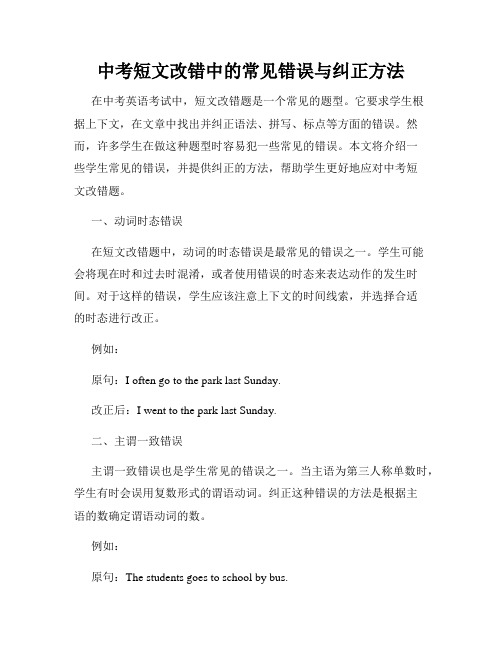
中考短文改错中的常见错误与纠正方法在中考英语考试中,短文改错题是一个常见的题型。
它要求学生根据上下文,在文章中找出并纠正语法、拼写、标点等方面的错误。
然而,许多学生在做这种题型时容易犯一些常见的错误。
本文将介绍一些学生常见的错误,并提供纠正的方法,帮助学生更好地应对中考短文改错题。
一、动词时态错误在短文改错题中,动词的时态错误是最常见的错误之一。
学生可能会将现在时和过去时混淆,或者使用错误的时态来表达动作的发生时间。
对于这样的错误,学生应该注意上下文的时间线索,并选择合适的时态进行改正。
例如:原句:I often go to the park last Sunday.改正后:I went to the park last Sunday.二、主谓一致错误主谓一致错误也是学生常见的错误之一。
当主语为第三人称单数时,学生有时会误用复数形式的谓语动词。
纠正这种错误的方法是根据主语的数确定谓语动词的数。
例如:原句:The students goes to school by bus.改正后:The students go to school by bus.三、冠词错误冠词错误是另一类常见的错误,学生可能会使用错误的冠词或者忽略冠词。
纠正这种错误的方法是根据名词的单复数、可数不可数等特点选择合适的冠词。
例如:原句:I want eat an apple.改正后:I want to eat an apple.四、单词拼写错误在短文改错题中,学生常常会犯单词拼写错误。
对于这种错误,学生应该仔细检查拼写,尤其是注意英文单词的大小写和双写规则。
例如:原句:He has a piono at home.改正后:He has a piano at home.五、代词错误学生在写代词时,有时会选择错误的人称代词或者指代不清。
对于这种错误,学生应该确定代词的指代对象,并选用合适的代词。
例如:原句:He bought a book, and she is interesting.改正后:He bought a book, and it is interesting.总结起来,中考短文改错题中常见的错误包括动词时态错误、主谓一致错误、冠词错误、单词拼写错误和代词错误。
短文改错题常见的错误类型

短⽂改错题常见的错误类型1、冠词的多⽤、少⽤、混⽤。
2、名词的数与格的误⽤。
3、主谓不⼀致的错误。
学⽣往往容易忽视定语从句中强调句型中的主谓⼀致性。
4、代词的指代不⼀致的错误。
代词的指代⼀致性包括⼈称、数、格和性四⽅⾯的统⼀。
代词的⼈称可分为第⼀、⼆、三⼈称和⾮⼈称;代词的数分为单数和复数;代词的格分为主格、宾格、所有格还有名词性物主代词;代词的性分为阳性、阴性和中性。
5、动词的时态、语态和语⽓的误⽤。
多数动词有时态、语态、和语⽓变化形式,还有上下⽂的时态呼应,主从句的时态⼀致。
6、⾮谓语动词的误⽤。
⾮谓语动词的难点主要体现在V—ing形式和过去分词的⽤法区别、V—ing形式与不定式的⽤法区别、以及⾮谓语动词的时态、语态的正确运⽤。
7、形容词、副词的混⽤及其⽐较等级的误⽤。
形容词⼀般在句中作定语修饰名词或代词,作表语说明主语的性质、特征;⽽副词的作⽤较复杂,常常修饰形容词、副词、介词短语、动词或全句。
形容词和副词⽐较等级的误⽤现象:①省略不当;②⾃⾝⽐较;③修饰语的误⽤;④than连接的两个⽐较对象不⼀致或不平⾏。
8、关联词语的误⽤。
关联词分并列连词 and,but,or,so,when等,从属连词——各种从句的引导词。
关联词语的误⽤除涉及到其基础知识,还涉及⾄⾏⽂逻辑关系。
短⽂改错题惯⽤的命题⼿法是:①and,but,or,so等之间的混⽤;②because 与so并⽤;③although与but并⽤;④why 与because并⽤;⑤come与go混⽤;⑥here与there混⽤。
9、平⾏结构的误⽤。
平⾏结构是指⽤⼀连串作⽤和结构相同的或相似的成份表达同⼀范畴或同⼀性质、密切关联的内容。
平⾏结构有词之间的平⾏、词组之间的平⾏、句⼦或从句之间的平⾏、段落之间的平⾏。
在平⾏结构中常⽤的并列连词有and,but,or,than等。
10、成分的多与少——多⼀词或少⼀词。
多或少的词语,常见于冠词、介词、不定式标记to等,不过有时也可能是实义词。
- 1、下载文档前请自行甄别文档内容的完整性,平台不提供额外的编辑、内容补充、找答案等附加服务。
- 2、"仅部分预览"的文档,不可在线预览部分如存在完整性等问题,可反馈申请退款(可完整预览的文档不适用该条件!)。
- 3、如文档侵犯您的权益,请联系客服反馈,我们会尽快为您处理(人工客服工作时间:9:00-18:30)。
短文改错四大错误类型总结老师叮咛:李辉老师说,英语学习的陷阱之一,就是“多做题”。
很多人一想到学英语就想到“多做题”,但是做了很久都没提分,原因何在?事实上,每道题目都背后都有其“方法”和“考点”。
下面的短文改错常见错误考点类型“很重要”!经过了全网首席高考英语名师李辉老师团队高度认真地整理校对,无错、可信!可供全国各省高中生打印、学习、背诵!一、动词①时态错误(过去时/现在时)eg: 1.Some people even hadhave to wait outside.2.Ithinkthought I would be happy there.①语态错误(主动/被动)注意:先翻译句子,后观察该词在句中是主动/被动。
eg: Every day he makes sure that fresh vegetables or high quality oil are using for cooking.每天,他都要确保新鲜蔬菜或高质量的油用于烹饪。
解析:using → used,根据句意此处表示被动含义,be used for“被用来去做”。
①主谓不一致(1)前文所提的主语与后文所述的谓语不一致eg: 1.The teacher were angry because we had the same answers in the tests.解析:were → was,The teacher是单数形式,谓语动词用单数形式。
2.The rest of the trees was cut down.解析:was → were,rest指的是可数名词的复数形式,谓语动词用复数形式。
(2)集体名词,谓语动词用复数。
如:people, cattle, group, family, government, team, police等。
eg: The police is coming this way.解析:is → are,The police是集体名词,故is → are。
(3)就近原则常见:neither...nor... / not only...but... / either...or... / not...but...eg: 1.Not only his parents but also he are crazy about the foreign films.解析:are → is,该处谓语最近的主语为he是第三人称单数,故谓语动词用第三人称单数形式。
2.Because of too much homework,neither you nor James go to the cinema to enjoythe fantastic movie named Ready Player One.解析:go → goes,该处谓语最近的主语为James是第三人称单数,故谓语用第三人称单数形式。
(4)There be句型eg: There has a big library in our school.解析:has → is,某地有某物,表存在用there be句型,且后面跟的是a big library单数。
(5)就远原则常见:except / with / together with / along with / as well as / includingeg: I as well as he is happy.解析:is → am,该处谓语最远的主语为I是第一人称,故谓语动词用第一人称am。
(6)缺少谓语动词(尤其缺be动词)eg: 1.Secondly, I always practice pronunciation and reading and speaking.解析:Practice → practise,practice的词性是名词,该句中没有与主语I相适应的谓语动词形式故把practice → practise(practise的词性是动词)则是在句中添加了一个谓语动词。
2.She very beautiful.解析:在She后加is,补齐主谓宾。
①非谓语错用(1)谓语动词与非谓语动词区分不清eg: There are thousands of examples tell us:if we want to succeed,weneed a correct direction.解析:tell → telling,there be 句型表示存在,是一个完整的句型结构,be动词就是谓语动词,所以句中若出现了其他动词,可以采用非谓语动词形式,因此动词tell不能直接使用原形,而且由于examples 和tell之间是主谓关系,所以要用tell的现在分词形式。
(2)V-ing和V-ed混用eg: We were exciting to hear the news.解析:exciting →excited,exciting修饰物,而excited修饰人。
(3)to的多用、少用或误用eg: 1.When I finally arrived at my friend’s he lent to me lots of clothes.解析:删除to,由lend sb. sth.(借给某人某物)可知,不用to,但如果将sth.放到前面,则用to。
2.This thing belongs me.解析:在belongs后加to,表示属于。
3.He was tall,with board shoulders and a beard that turned form black towardsgray over the years.解析:towards → to,form ...towards...“从...走向...”,form...to...“从...到...”,根据句意towards → to。
①虚拟语气误用eg: Then he and my mother would have had a drink while she prepared dinnerand they would talk about his day and hers.解析:去掉had,句意:他和我妈妈会喝些东西。
这里不是虚拟语气,不能用would have done,用would do表示“过去常常做”。
二、名词①缺主/宾语,补名词/代词eg: I wanted to reward the old woman for the trouble I had caused.But she refused.解析:在caused后加her,缺少宾语。
①that/those(表示跟上文同类事物比较)eg: My books are more difficult than of Jerry’s.解析:在than后加those,缺少代词,代指books。
①反身代词eg: Tom felt that he knew everybody’s business better than they knew it them.解析:them → themselves,主语是他们,宾语也是他们,宾语的他们用themselves。
①名词前加限定词(冠词,形容词性物主代词,指示代词)如:a / an / the / my / your / his / her / their / this / that / there / theseeg: 1.An American and a Frenchman decided to cross the sea betweenFrance and England in the balloon in 1784.解析:the → a,此处指乘坐一个气球横过海洋,第一次提到用a。
2.I wanted to reward the old woman for the trouble I had caused hers.But she refused.解析:hers → her,此处为宾语,后无名词,故选用形容词性物主代词。
①单复数形式常见不可数名词:advice / information / fun / equipment / news / furniture / baggage / luggage / traffic / knowledge / homework / progress / work / paper / food / change / water / joy / hair常见单复数同形名词:sheep / fish / Chinese / cattle / bison / deer / people / clothes eg: As for most of us, we missed many chance to earn more money, to get a high position and to realize our dreams.解析:chance → chances,many后用复数。
三、形容词/副词①修饰名词或作表语,用形容词。
eg:It was both excited and frightening to be up there!解析:excited → exciting,主语是形式主语it,真正的主语是to be up there,主语是物的时候,表语应该用现在分词形式的形容词。
①提示词是形容词,常变副词。
eg: 1.He must be mental disabled.解析:mental → mentally2.When I was a very young children,my father created a regularpractice I remember well years late.解析:late → later①比较级/最高级eg:1.As for most of us, we missed many chance to earn more money, to get a high position and to realize our dreams.解析:high → higher,翻译为更高的位置。
2.They were also the best and worse years in my life .解析:worse → worst,并列结构。
四、句子结构题①介词+名词eg:The only reason a man would sell salt a lower price would be becausehe was desperate for money.解析:在salt 后加at。
